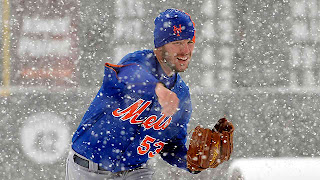The wicked weather in the North-Midwest and baseball's unbalanced schedule continue to torment the New York Mets on this road trip. For the third time in this trip the Mets had a game snowed out, as their Wednesday night contest in Colorado was postponed as the Mile High City got hit with 4-6 inches of snowfall.
Monday's contest was postponed because of eight inches of snow, and had to be made up as part of a double-header on Tuesday; a double-header that turned into a nightmare for the Mets.
In case you are keeping score, Sunday's game in Minnesota was also canned because of snow.
Thanks to baseball's unbalanced schedule the Rockies, the Mets and MLB have yet to determine what they will do with the game that was snowed out on Wednesday night -- there will be no double-header on Thursday. That means, the league has to find a date later in the summer where they can make up this game between the two teams.
The fact that a make-up date could not be determined immediately speaks volumes to the schedule that MLB has made this year.
Once the Houston Astros moved out of the National League to join the AL West, it created an unbalanced schedule where teams are now required to play interleague games over the course of the entire year, AND as a result can not play teams from the own league more than once in a certain city. For example, the Mets get only one visit to Colorado, and the Rockies make only one trip to New York in 2013.
In the previous schedule, when there were 14 teams in the AL and 16 teams in NL, it allowed MLB more flexibility to schedule games -- meaning there would be a chance that a second trip to a particular city would occur during the season, allowing possible make-up games to be used during that trip.
Now that is not the case. Now, teams have to struggle to find room in a crammed schedule to make up games over the course of the season.
The Yankees already had two games whipped out in Cleveland last week, and it took three days for officials to find a date to play the two games, which is May 13.
The Mets are scheduled to play in Minnesota on August 19, after a west coast trip to Los Angeles and San Diego. Now they have to find another day to make up this game in Colorado -- which won't be easy since the league and both the Rockies and the Mets have to find a reasonable and common off day for both teams.
If this trend continues, teams will run out of common off days, and the league would have to consider the least tasteful option: canceling the rained out games altogether.
How can MLB fix this problem? Forget a dome on stadiums in the North-Midwest, taxpayers will never go for it; they didn't even want domes on their ball parks when the stadium was constructed the first time.
There are three options: 1) Schedule teams from the north to open the season on the road for the first 10 days of the season. That means the ilks of Colorado, Detroit, Minnesota, and both Chicago teams would open their seasons away from home -- and can't have their home opener until the middle to later part of the month.
2) Instead of scheduling interleague and league games in the month of April, schedule divisional match-ups only in the first three weeks of the season so if those games were to face a weather related cancellation, they can easily be made up later in the year. Currently the Mets play the Padres, Twins and Rockies in the first two weeks of the season, and only six games against the NL East. Not good.
3) Get rid of Interleague play? Would love to do it, but with 15 teams in each league it can't be done. Without interleague play teams would be forced to take unwarranted off days because there is no opponent for them to play on a given day.
If MLB had kept the the AL with 14 teams and NL with 16 teams, they could have easily done away with interleague play and not face the harsh reality an odd number of teams creates in each league. Thus, another option would be expansion. Expand the majors to 32 teams, with 16 teams in each league could make riding baseball of interleague play a possibility.
This is one giant snowball that is becoming the size of a mountain, and it is time for MLB to address this ASAP.


No comments:
Post a Comment